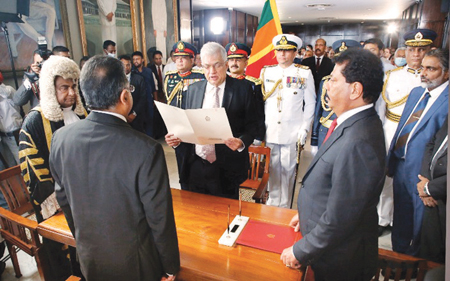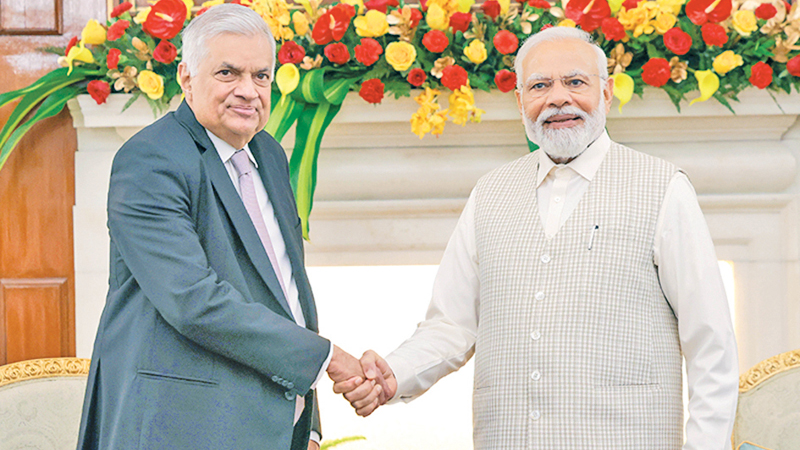The 1980 strike and racist riots in 1983 darkened the month of July in Sri Lanka. Fast forward to 2022, and the Galle Face Aragalaya (Struggle) reached a decisive turning point with the May 9 attacks on ruling party politicians and their homes, heating up in July once more.
This attack marked a major shift towards violence in the anti-Government protests. Consequently, President Gotabaya Rajapaksa, elected to protect the nation in 2019, had to flee the country on July 13, 2022, and he resigned the next day from overseas. On July 21, 2022, then Prime Minister Ranil Wickremesinghe became President.
Wickremesinghe, who had held only one Seat in Parliament as the Leader of the UNP from the previous General Election (GE), faced ridicule from the collective Opposition, being called “Ping President” and “Ranil Rajapaksa.” This was due to the support he received from the Sri Lanka Podujana Peramuna (SLPP or Pohottuwa), securing 134 votes in the Parliamentary Poll under the Presidential Elections (Special Provisions) Act.
Economic crisis
At the time President Wickremesinghe took office, Sri Lanka was grappling with its worst economic crisis and a period of violent unrest. Within 12 hours of his swearing-in, Wickremesinghe deployed the Security Forces to clear protesters from the Presidential Secretariat and nearby areas. He also took immediate steps to resolve the acute shortages of fuel and LP Gas, addressing some of the critical issues facing the country.
As each sector began to recover, President Ranil Wickremesinghe presented a four-step plan to Parliament for the country’s revival:
1. Extended Credit Facilities and Financial Discipline: Consult the International Monetary Fund (IMF) to secure an Extended Fund Facility (EFF) and establish financial discipline in the country.
2. Debt Stabilisation Plan: Collaborate with international financial and legal experts, Lazard and Clifford Chance, to prepare a debt stabilisation plan in coordination with the IMF and reach an agreement with the creditors.
3. Economic Strengthening and Reforms: Implement policies, rules, and programs to boost the export economy and create a Digital Green Economy, while preparing and presenting the necessary economic reforms.
4. Vision for 2048: Achieve a developed, debt-free advanced economy by 2048 (the 100th anniversary of Sri Lanka’s Independence) through this program.
Since then, he embarked on the challenging journey described as the “Vine Bridge” (Wel Paalama) when he first accepted the challenge. The national Budgets of 2023 and 2024 further strengthened his program, and the country is now reaping the benefits. There are no more fuel and LP gas queues, and there is no shortage of medicine.
Power cuts, which lasted about 14 hours a day in 2022, are no longer an issue. Inflation, which soared to 70 percent in 2022, has dropped to 1.7 percent. After six consecutive quarters of economic contraction, the economy has begun to grow again. Foreign reserves, which were almost depleted by May 2022, have risen to US$ 5.41 billion by May 2023. The Sri Lanka Rupee (LKR) has also strengthened against the US Dollar (USD).
The Primary Account deficit has turned into a surplus. With the Central Bank of Sri Lanka’s (CBSL) independence and the IMF agreement, the Budget deficit can now be managed without printing money. There is a current account surplus in the balance of foreign payments. Due to the successful program with the IMF, after two years, Sri Lanka can legally engage with international financial organisations and foreign countries.

Ranil Wickremesinghe is being sworn in as the eighth Executive President of the Democratic Socialist Republic of Sri Lanka
The success of the debt restructuring process means that Sri Lanka is no longer considered bankrupt and is recognised internationally as capable of paying its debts. The debt repayment period has been extended to 2043, providing US$ 8 billion in relief. This is a significant achievement for a country that recently spent over 70 percent of its total income on loan interest and installments.
To support the community hardest hit by the economic crisis, the Aswesuma social security program was launched with three times the funding of the Samurdhi program. This initiative now benefits 2.3 million people, compared to the previous 1.4 million.
The Urumaya program is providing land rights to two million people, and the title deed program is securing housing rights for residents of urban flats. The country is preparing for major advancements in agriculture and industry, including modernisation of farming practices.
New laws have been enacted to fight corruption, improve security, and ensure financial discipline through the Economic Transformation Act and the Public Financial Management Act. During this period, a record number of Ordinances was passed quickly. President Ranil Wickremesinghe, who advocates for moving away from a subsistence and import-based economy, is focused on transitioning to an export-driven and Green Economy. Efforts are also under way to establish trade agreements centered on Renewable Energy.
While severe economic crises globally often lead to public sector spending cuts and staff reductions, President Wickremesinghe’s recovery plan for Sri Lanka did not include such measures. Instead, he increased civil servants’ salaries by Rs. 10,000, avoided populist decisions, and introduced tax reforms to boost State revenue.
Effective policies
Sri Lanka, located strategically in the Indian Ocean Region (IOR), is expected to become a significant player in the region. President Wickremesinghe aims to leverage this position, even if it means challenging global powers. His focus is on implementing effective policies to enhance the country’s role and value in the IOR. Incidentally, Sri Lanka is now the Chair of the Indian Ocean Rim Association (IORA).
From a populist perspective, taking such actions might seem like political suicide. However, for President Wickremesinghe, the well-being of 22 million people was more important than his own political future. In politics, it’s not enough to just make speeches or announce decisions. Effective governance needs accurate predictions about the outcomes of decisions. Decisions made without careful consideration can be very risky.
President Gotabaya Rajapaksa’s tenure highlighted this lesson, and failing to learn from these experiences has been a major mistake of the current Opposition.
For instance, Samagi Jana Balawegaya (SJB) Leader Sajith Premadasa’s reluctance to take responsibility for the country, despite the economic data, reflects both a personal hesitation and a lack of vision or plans to address the data. Similarly, Anura Kumara Dissanayake (AKD), who is now the Leader of the Janatha Vimukthi Peramuna (JVP) and its new avatar the National People’s Power (NPP), preferred to join violent protests rather than work towards solving the crisis and protecting the country’s future.
Clear plan
In sharp contrast, President Wickremesinghe had a clear plan to resolve the crisis and understood the potential results of his approach. The choice now rests with the people: they can either continue to lament the actions of those who once damaged State property and avoided challenges or support a leader who has faced the crisis head-on and worked towards a viable solution.
Did President Wickremesinghe really take office for his own benefit? While the Opposition criticised him harshly, the President worked tirelessly to fix the nation’s problems. Despite attacks and slander, he was focused on restoring the country, which had been led astray by both the Gotabaya Rajapaksa administration and previous leaders.
While the Opposition focused on trivial issues, President Ranil Wickremesinghe was dedicated to guiding the country out of a possible famine and further economic turmoil. He was also preparing for debt restructuring and rebuilding the nation’s financial stability. His efforts aimed to ensure that Sri Lanka would not fall into another crisis of the magnitude of 2022.
By July 21, 2024, marking two years since his inauguration, President Wickremesinghe will have achieved significant progress. Surveys, like those from Verité, confirm that he has managed to restore the country to its state in 2018, reversing the damage done to the economy and other sectors.
The collective Opposition, which failed to support this recovery program and tried to lead the country back into another major crisis, is now politically discredited in the eyes of the people. The key now is to avoid repeating past mistakes, stabilise the economy further, and move towards rapid development. This critical period must be handled carefully, and President Wickremesinghe is rightfully seen as the right leader for this onerous task.
As the public evaluates the situation, they will likely see the value in President Wickremesinghe’s leadership over the failed approaches of the past leaders. The day is approaching when the people will choose to retire those who failed the country and support President Wickremesinghe for his successful leadership for many more years to come.




